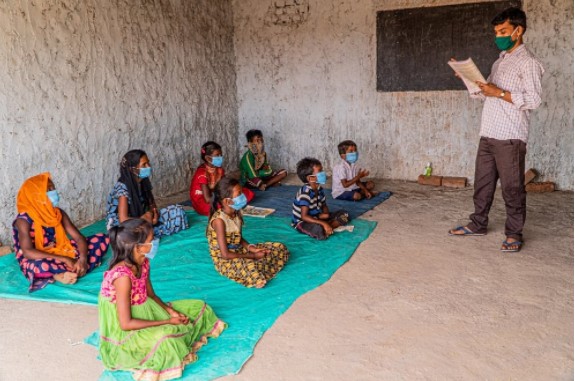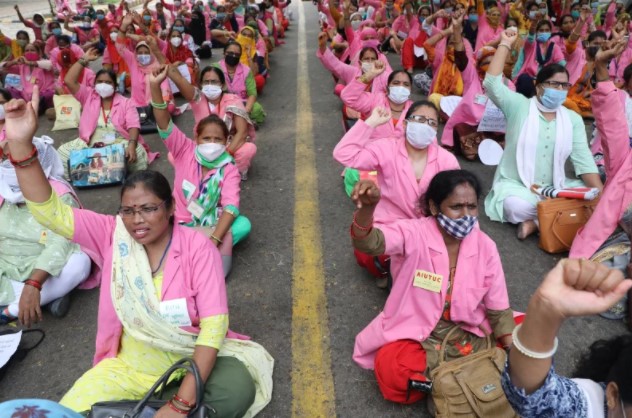
Today we stand in the midst of ashes, bodies, and empty oxygen cylinders. Most of us have lost someone we know to this pandemic, most of us have felt deeply the pain of this disease. Some of us have walked from hospital to hospital in search of blood, medicines, or hospital beds. Some of us have spent hours on the phone trying to arrange facilities for strangers, to save their lives. Some have lost our jobs, our incomes, our homes, others have spent the past year in abusive spaces we thought we had escaped. All of us have been affected, in so many different ways.
Yet the pandemic rages on.
Although I write this letter to the future, I do not know when to address it. Six months hence? One year? Two years? When will things be normal again?
It seems strange to think of a ‘normal’ now. Entire sectors such as tourism and aviation have crashed with the lockdowns, and their employees have either faced massive pay cuts or lost their jobs. Gig and contract workers have been without jobs for over a year now, and the employment rate touched 8.6% in April this year. While smaller businesses have often barely been able to survive and big companies largely have been doing well with their employees working from home, the fact remains that work as we know it has drastically changed for everyone.
Education has changed, too; and like in employment, the pandemic has only widened social and economic disparities. Wealthy private institutions were able to shift entirely to a functioning online medium, other schools and colleges have struggled with the transition. Students of government schools, for example, have not received continuous and quality education for over twelve months, owing to a complete lack of digital education infrastructure. Children have not been able to socialise, have meaningful peer-to-peer interactions, or engage in any means of social learning. Even worse, there have been huge leaps in instances of child abuse, child labour, and early marriage.
It is true that beyond the obvious medical crisis the pandemic has not created new problems as much as revealed existing structural issues. But perhaps we must ask ourselves this: can we now take the chance to observe, understand, and work towards fixing the mess in our hands? What is the way forward?
In this one long year of pain, heartbreak, and collective grief, we have seen some bright instances of hope: individuals and groups who worked tirelessly for the sole motive of making things liveable for other people. Essential workers- municipal staff, doctors, nurses, delivery personnel, vegetable-vendors, and so many, many more- have gone above and beyond to answer their call of duty. And when the time comes to thank them, it must not be through just empty words, clapping, or banging vessels, but through real, tangible measures to compensate them and ensure their safety and security.

Our children cannot be left behind either. After this wave recedes, vaccines must reach them on priority. Government teachers, who support not just their own families but swathes of low-income children, must urgently receive adequate support from the government. The pandemic has also shown us that the need of the hour is robust, publicly-funded education for all, with strong digital and non-digital infrastructure.
As we deal with the after-effects of the pandemic and stop to pick-up the pieces of our old world, it is also crucial to remember that the marginalised will always be disproportionately affected by any crisis. Dalits, Bahujans, and Adivasis have always been especially vulnerable without the strong safety net that comes with caste privilege- and even more so in this past year. Yet, as always, there has been minimal assistance from the government. Social and economic independence is much harder for women, sexual minorities, and non-binary and queer people now with rising unemployment and increasing instances of domestic abuse. The health care emergency has also made life much harder for people with disabilities due to the lack of access to important medical facilities, caregiving, accommodations, and educational institutions. Those with intersections of privilege must constantly remember that we have the responsibility to amplify voices of those that do not, use our power to press for restructuring and relief, and not take up space in dialogue that is not ours.
My own impression of the future is, admittedly, pessimistic. Yet there is some space for hope. Some of us, in our online classes and work meetings, saw our professors, classmates, and colleagues on a more personal level than ever before. We may have heard dogs barking in meeting backgrounds, seen a crying child demand for a parents’ attention, cried for a friend we knew only on-screen, and received love and empathy for our struggles. Let us carry this kindness forward whenever we move back to an offline world. Let us give people the benefit of doubt, and remember that some losses take time to heal. Let us allow people to take breaks when they must, be more generous with our affection, and treasure the friendships that have kept us going. Let us hope for a future with recovery, health, and closure.
Sookthi Kav is From Bengaluru, currently a second-year history student at LSR, Delhi University. Loves reading, dance, and classical music. Current Role: Student, writer at Itisaras (Dhaara) ,Ultimate goal: To work in a field where I can learn, explore, and contribute positively to society in some way, and to be happy. Biggest achievement: So far, learning to drive! Educational Qualification: BA (Hons.) History.


